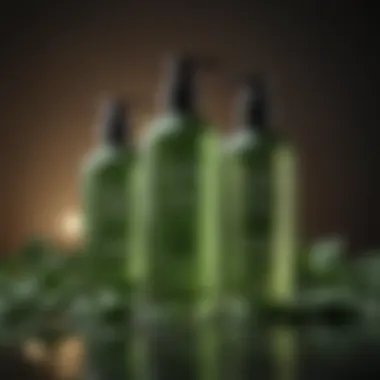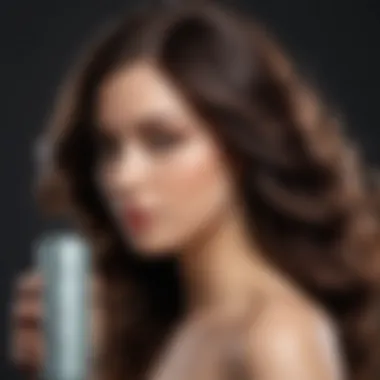Unlock the Secrets: The Ultimate Guide to Shampoo and Conditioner for Thin Wavy Hair


Fashion Trends and Must-Have Pieces
When it comes to choosing the perfect shampoo and conditioner for thin wavy hair, understanding current trends and essential products is crucial. Runway reports and street style features often showcase hair trends that influence the ideal hair care products for those with thin wavy locks. Seasonal must-haves can guide individuals in selecting the most appropriate hair care regimen tailored to their specific needs and preferences.
Beauty Tips and Tricks
Skincare routines and makeup tutorials play a significant role in complementing the effects of the right shampoo and conditioner on thin wavy hair. Knowing how to care for your skin and apply makeup that enhances your features can enhance the overall look and feel of your hair. Incorporating hair care tips into your beauty routine can further optimize the efficacy of your chosen hair products.
Celebrity Style and Red Carpet Looks
Celebrities often set the bar high when it comes to hair trends and styles. Celebrity fashion spotlights and red carpet event coverage offer insights into the hair care products favored by those with thin wavy hair in the spotlight. Understanding the style breakdowns of celeb hair looks can provide inspiration for individuals looking to elevate their own hair care routine with top-notch products.
Fashion Industry News and Events
Keeping up with fashion industry news and events can unveil exciting developments in hair care technology and formulations. Updates from fashion weeks, product launches, and industry insider insights can introduce cutting-edge shampoo and conditioner options for thin wavy hair. Staying informed about the latest advancements ensures that individuals can make informed decisions when choosing hair care products that align with both their hair type and the current market trends.
Understanding Your Thin Wavy Hair
When it comes to caring for thin wavy hair, understanding its unique characteristics is paramount. Thin wavy hair typically boasts a delicate texture that requires special attention to maintain its health and vitality. The texture of thin wavy hair not only influences how products interact with it but also plays a key role in styling and overall appearance. Properly identifying the texture of your hair enables you to tailor your hair care routine effectively, ensuring that your locks stay nourished and full of life.
Characteristics of Thin Wavy Hair
Texture
The texture of thin wavy hair refers to its fineness and how it feels to the touch. This aspect of hair type is crucial as it determines the level of moisture absorption and product absorption your hair can handle. Thin wavy hair tends to be softer and more prone to tangling compared to thicker hair textures. Understanding the texture of your hair aids in selecting the right products that provide adequate nourishment without weighing it down.
Volume
When discussing thin wavy hair, volume plays a vital role in transforming lackluster locks into a voluminous mane. Thin wavy hair often struggles with maintaining volume due to its delicate nature, making it essential to choose products that add body and lift. Incorporating volumizing agents in your hair care routine can help amplify the natural volume of wavy strands, giving your hair a fuller and more vibrant appearance.
Frizz
Frizz is a common challenge faced by individuals with thin wavy hair, especially in humid environments. Managing frizz is essential to maintain a sleek and polished look. Understanding how frizz affects your hair allows you to select products that combat frizz and provide smoothness and definition to your waves.
Challenges Faced with Thin Wavy Hair
Thin wavy hair presents unique challenges that can impact the overall health and appearance of your hair. Addressing these challenges is crucial to achieving optimal hair care results tailored to your specific needs.


Lack of Volume
One of the primary issues faced by those with thin wavy hair is the lack of volume. This lack of body can make the hair appear flat and lifeless. By targeting this challenge with effective products and styling techniques, you can enhance the volume of your hair, creating a fuller and more voluminous look.
Difficulty in Styling
Thin wavy hair can be tricky to style, requiring careful manipulation to achieve desired results. The waviness of the hair, combined with its fine texture, can make styling a challenge. Understanding the difficulties inherent in styling thin wavy hair helps you adopt techniques and use products that simplify the styling process and enhance the overall appearance of your locks.
Oiliness
Another common struggle for individuals with thin wavy hair is dealing with oiliness. The scalp's natural oils can weigh down thin hair, leading to a greasy and unkempt appearance. Managing oiliness involves selecting products that balance moisture levels without exacerbating the issue, promoting fresh and healthy-looking hair.
Choosing the Right Shampoo for Thin Wavy Hair
In the vast landscape of hair care, selecting the right shampoo tailored to the specific needs of thin wavy hair holds paramount importance. Thin wavy hair comes with its own set of challenges like maintaining volume, managing frizz, and combating oiliness. Therefore, choosing a shampoo formulated to address these concerns is crucial for achieving healthy, luscious locks. The right shampoo can add volume, enhance waves, and provide essential nourishment without weighing the hair down.
Key Ingredients to Look For
Volumizing Agents
When it comes to thin wavy hair, volumizing agents play a vital role in adding body and thickness to the hair strands. These agents help create the illusion of fuller hair by lifting the roots and enhancing overall volume. By choosing a shampoo infused with volumizing agents, individuals with thin wavy hair can enjoy bouncier, more voluminous tresses that exude vitality and vibrancy.
Hydrating Components
Hydration is key for maintaining the health and appearance of thin wavy hair. Hydrating components such as natural oils, glycerin, and panthenol work to moisturize the hair, preventing dryness and brittleness. These components help in improving the hair's elasticity, smoothness, and overall texture, leaving it looking nourished and radiant.
Sulfate-Free Formulations
Sulfates, commonly found in many shampoos, can strip the hair of its natural oils, leading to dryness and damage, especially for those with thin wavy hair. Opting for sulfate-free formulations ensures a gentle yet effective cleansing experience that maintains the hair's moisture balance. Sulfate-free shampoos are milder on the scalp and hair, making them an ideal choice for individuals looking to preserve the health and integrity of their thin wavy locks.
Best Shampoo Brands for Thin Wavy Hair
Oribe
Renowned for its luxurious formulations, Oribe offers a range of shampoos crafted to cater to various hair types and concerns, including thin wavy hair. Oribe shampoos are packed with premium ingredients that deliver exceptional results, from boosting volume to enhancing natural waves. The brand's dedication to quality and performance makes Oribe a top choice for individuals seeking salon-worthy hair care at home.
Living Proof
Living Proof stands out in the hair care industry for its innovative approach to product development. With a focus on science-backed formulas, Living Proof shampoos for thin wavy hair are designed to provide tangible results. The brand combines cutting-edge technology with nourishing ingredients to address common hair issues like lack of volume and frizz, making it a go-to option for those seeking effective solutions.


Briogeo
Briogeo prides itself on offering clean, natural hair care solutions suitable for all hair types, including thin wavy hair. Their shampoos are powered by plant-based ingredients that nourish the hair while addressing specific concerns like dehydration and dullness. Briogeo's commitment to sustainability and transparency makes it a popular choice among consumers looking for holistic hair care options that prioritize both effectiveness and environmental consciousness.
Optimizing Conditioning Routine for Thin Wavy Hair
Benefits of Conditioning
Hydration
Hydration is a pivotal aspect of the conditioning process for thin wavy hair. The key characteristic of hydration is its ability to replenish moisture lost during cleansing and styling. In this context, hydration plays a vital role in promoting hair elasticity, preventing breakage, and maintaining a healthy scalp. The unique feature of hydration lies in its capacity to nourish the hair strands from within, resulting in improved texture and shine. While hydration offers numerous advantages, such as improved manageability and reduced brittleness, it may lead to excessive moisture if not balanced well with other conditioning elements.
Detangling
Detangling is another essential benefit provided by conditioning routines. The primary function of detangling is to smoothen out knots and tangles, making the combing process easier and less damaging. Effective detangling can prevent hair breakage and reduce styling time. The standout characteristic of detangling products is their ability to lubricate the hair fibers, enabling gentle separation without causing friction-induced damage. While detangling contributes significantly to hair care, over-reliance on detangling products may lead to product buildup and reduced natural hair resilience.
Frizz Control
Frizz control stands out as a vital component of conditioning for thin wavy hair. The key aspect of frizz control is its capability to smooth unruly hair strands, minimizing flyaways and enhancing overall hair appearance. Frizz control products contain ingredients that seal the hair cuticle and reduce moisture absorption, resulting in smoother, sleeker locks. The unique feature of frizz control lies in its ability to provide long-lasting effects without weighing down the hair. While frizz control is crucial for achieving polished hairstyles, excessive use of frizz-taming products may lead to product residue accumulation and decreased hair volume.
Styling Techniques for Thin Wavy Hair
Thin wavy hair presents unique styling challenges that require tailored solutions. In this section, we delve into the crucial topic of styling techniques specifically curated for thin wavy hair. Understanding how to style this hair type correctly is vital in achieving the desired look and maintaining hair health. By implementing the right styling techniques, individuals with thin wavy hair can enhance their natural beauty effortlessly.
Heat Styling Considerations
Heat Protectants
Heat protectants play a pivotal role in safeguarding thin wavy hair from the damaging effects of heat styling tools such as curling irons or straighteners. Their formulation typically includes ingredients that create a protective barrier to minimize heat damage. Heat protectants help retain the hair's moisture, preventing dryness and breakage. Despite the popular usage of heat styling tools, incorporating a heat protectant in your hair care routine is essential for preserving the health and integrity of thin wavy hair.
Low Heat Settings
Utilizing low heat settings on styling tools is beneficial for thin wavy hair as high temperatures can cause unnecessary stress and damage. Lower heat settings reduce the risk of heat-related hair issues while still effectively styling the hair. By adjusting the heat settings to a gentler level, individuals can style their hair without exposing it to excessive heat, promoting healthier and shinier hair in the long run.
Avoiding Over-Styling
Over-styling, a common pitfall in hair care routines, can have adverse effects on thin wavy hair. Excessive use of styling tools or products can lead to dryness, breakage, and loss of natural hair texture. By avoiding over-styling, individuals can prevent damage and maintain the natural beauty of their thin wavy hair. Moderation and restraint in styling practices are key to keeping the hair healthy and vibrant.
Enhancing Natural Waves
Twisting Techniques
Twisting techniques are a versatile and effective method for enhancing the natural waves of thin hair. By twisting sections of hair gently and letting them set, individuals can create soft, natural-looking waves without the need for heat styling. Twist-outs are a popular styling choice for those with thin wavy hair as they add texture and volume without causing damage.
Diffuser Usage
Incorporating a diffuser attachment when drying hair can help accentuate the waves and curls in thin hair. The diffuser disperses airflow evenly, reducing frizz and enhancing the hair's natural texture. By using a diffuser on a low heat setting, individuals can achieve defined waves without compromising the hair's health. This technique is particularly beneficial for those looking to embrace their natural hair texture.
Air Drying Methods
Opting for air drying methods is a gentle approach to styling thin wavy hair without heat exposure. Allowing the hair to dry naturally helps maintain its moisture balance and minimizes the risk of heat damage. Air drying is a convenient and low-maintenance styling method that promotes the natural wave pattern of thin hair. By embracing air drying, individuals can enjoy beautifully styled hair while prioritizing hair health.
Maintenance Tips for Healthy Hair
In the realm of hair care, maintenance tips are essential for nurturing healthy and thriving hair, especially for those with thin wavy hair. Regular upkeep not only ensures the longevity of hair but also contributes to overall hair health. The significance of maintenance tips in this article lies in their ability to provide guidance on sustaining voluminous and luscious tresses. Within this section, we will delve into crucial elements that encompass a well-rounded approach to hair care.
Regular Trimming
Benefits of Trimming
Exploring the benefits of trimming unveils a fundamental aspect of maintaining healthy hair. Trimming helps in removing split ends, preventing hair breakage, and promoting hair growth. The key characteristic of regular trimming is its ability to maintain hair length while ensuring that the hair remains healthy and free from damage. This practice is particularly advantageous for thin wavy hair, as it prevents the ends from appearing thin and sparse, resulting in a more voluminous and textured look. Embracing regular trims not only enhances the appearance of the hair but also contributes to its overall strength and vitality.
Frequency Recommendations
Addressing frequency recommendations provides insights into the optimal timing for hair trims. It is recommended to trim thin wavy hair every 6-8 weeks to maintain its shape and health. This periodic trimming schedule helps in eliminating any split ends that may hinder hair growth and disrupt the hair's natural texture. Adhering to proper frequency recommendations ensures that the hair continues to look fresh and vibrant, promoting its overall well-being.
Professional vs. DIY
The comparison between professional and DIY trimming methods presents individuals with choices on how to approach hair maintenance. While professional trims offer precision and expertise, DIY trims provide convenience and cost-effectiveness. Opting for professional trims allows for a tailored approach to hair care, ensuring that specific needs of thin wavy hair are met. On the other hand, DIY trims offer flexibility and the ability to maintain hair health from the comfort of one's home. Balancing between the two methods can result in a well-rounded trimming routine that caters to the unique demands of thin wavy hair.
Scalp Care Importance
Proper scalp care is imperative for maintaining healthy hair, particularly for individuals with thin wavy hair. Caring for the scalp not only promotes hair growth but also prevents scalp issues such as dandruff and itchiness. The essence of scalp care in this article lies in its capacity to lay the foundation for strong and resilient hair. Within this segment, we will explore distinct aspects of scalp care that contribute to overall hair vitality.
Scalp Massage Techniques
Understanding scalp massage techniques sheds light on the benefits of stimulating the scalp. Scalp massages increase blood circulation, thereby promoting hair growth and enhancing the scalp's health. The key characteristic of scalp massage techniques is their ability to relax the scalp, release tension, and facilitate nutrient absorption. Incorporating scalp massages into a hair care routine can result in improved hair texture and increased hair resilience.
Choosing Scalp-friendly Products
Selecting scalp-friendly products is integral to maintaining a healthy scalp environment. Scalp-friendly products are formulated to nourish the scalp, regulate oil production, and promote overall scalp health. The key characteristic of scalp-friendly products is their ability to address specific scalp concerns without causing irritation or imbalance. By choosing products that align with the scalp's needs, individuals with thin wavy hair can cultivate a conducive environment for optimal hair growth and maintenance.
Exfoliation Benefits
Exploring the benefits of scalp exfoliation unveils a valuable practice for maintaining scalp health. Scalp exfoliation aids in removing dead skin cells, unclogging hair follicles, and promoting scalp rejuvenation. The key characteristic of scalp exfoliation is its ability to provide a clean and healthy foundation for hair growth. By incorporating scalp exfoliation into a regular hair care routine, individuals can alleviate scalp issues, improve hair texture, and foster a nourishing environment for their thin wavy hair.







